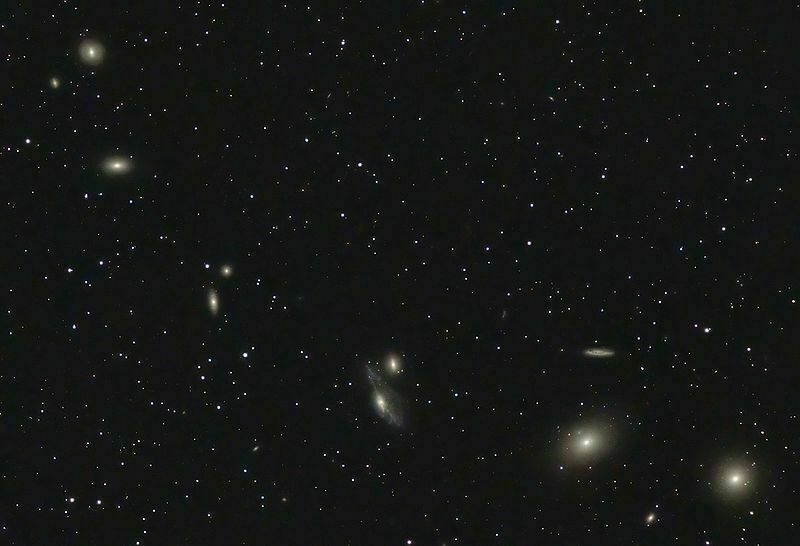How and why to record your astronomy observations
 |
| M84 is the last, in the bottom right of this chain. M86 is the large, slightly oblong galaxy to the left of M84. |
In looking through the notes that I did record, starting sometime in November, I realize now what a poor job I was doing. I expect I may one day look back at my current notes and think the very same thing. Here's an example. For M84 my description was simply "A fantastic cluster of galaxies - beautiful." That's not the correct way to do it. For starters, M84 is a single galaxy that is a part of a string of galaxies called the Markarian Chain. It would have been fine for me to describe it as a part of that chain but I should have included a description of the object too. Probably something along the lines of "M84, a lenticular or elliptical galaxy, presents as a spherical halo with a stellar core." That is still a pretty basic description but it would be a step in the right direction. I could have added something about it's relationship to nearby M86, perhaps comparing the two and noting that M84 is more spherical with a slightly brighter core while M86 is slightly less bright with a more oblong shape. This is far more complete and will help me remember what it is I've seen.
As for the how of basic observation and recording, I use an iPad, spread sheet and database. Each observation gets logged into the spreadsheet on the iPad which is later entered into a FileMaker database. I record the date, time, atmospheric conditions, telescope used and eyepieces used. Lately I've also been recording temperature. Last is a brief 2-4 sentence description of the object and how it might appear in relation to other objects in the eyepiece. The more detail I can record the better I'll remember the observation when I read the description later. Also of great importance is that in recording observations, in looking for detail, we're actively training our eyes and brains to see better. The recording reinforces the observing skills and the increased observing skills, in turn, result in better written notes. One last thought, I also make it a point to at least skim the description of the object in Sky Safari as it often notes what should be visible in an amateur scope. I am also sure to study the image presented as a guide in observation of detail. The photos are far more detailed than what we can expect to see with our eyes but after a bit of practice I've learned to translate the images into more realistic expectations. They present the ideal of what is there.
Amateur astronomy, as I've written before, is a great way to learn some of the basic skills of science. Namely, the importance of consistent and methodical observation/data collection as well as consistent and methodical recording of that data. Amateur astronomers regularly contribute to the collection of data used in the field and with citizen science projects such as Zooniverse they are also helping to analyze the data collected by the many space telescopes currently collecting vast amounts of data. Whether they are finding NEOs (near earth objects such as asteroids) or finding exoplanets, amateurs are contributing to the science. It requires a certain level of observational skill, a willingness to increase that skill, and time. That's about it. Well, actually, it can be quite a bit more complicated and the time involved can be great if one is serious about certain areas such as the search for NEOs which requires not just detailed observation but consistent and methodical photography.
One last point. For anyone getting involved in amateur astronomy there is the side benefit of not only paying closer attention to what is being done by scientists in the field but also a very real-world personal benefit of a much deeper, more meaningful understanding of how science works generally and just how complicated the work really is. I can say that in just a few months my level of understanding, though still pretty basic, has been greatly increased and my appreciation for the work of NASA and others is now on an entirely different level.
Dark Skies to you!